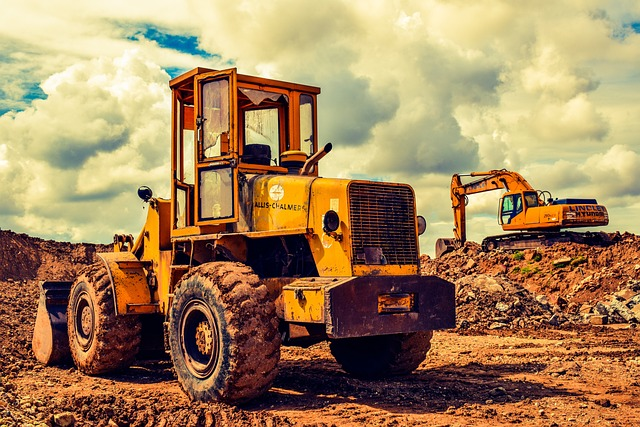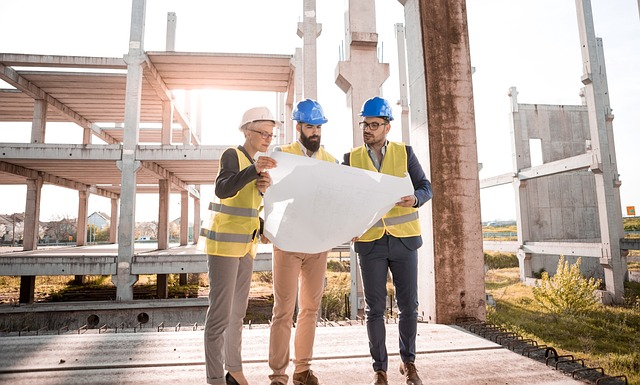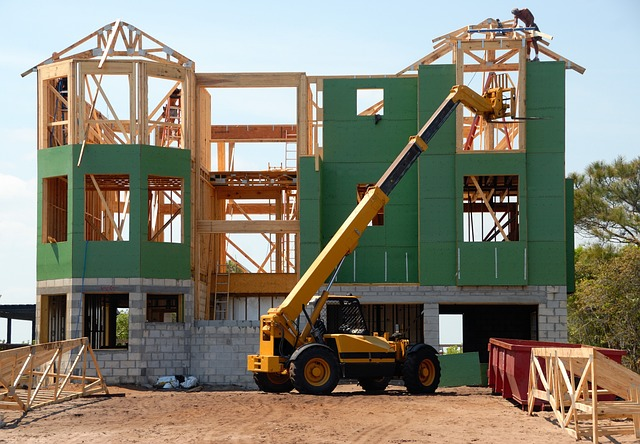What is a Commercial Construction Loan?
A commercial construction loan is specifically designed to fund the construction phase of a new building or renovation project (sometimes called a rehab or renovation loan). It’s similar to a home construction loan but for commercial purposes. However, this type of loan differs from traditional mortgages and offers unique terms tailored to the construction process.
The loan term for a commercial construction loan typically ranges from six months to three years, allowing borrowers enough time to complete the project. During this period, the borrower receives funds in stages as the construction progresses.
The loan amount is based on factors such as the property’s appraisal and the project’s overall cost. The borrower makes interest-only payments during the construction phase, with a final lump sum payment due at the end of the term.
One key advantage of a commercial construction loan is that it provides flexibility for both the borrower and the contractor. The funds are disbursed as needed, ensuring there are enough resources available to complete each stage of the project efficiently.
How do Commercial Construction Loans work?
Commercial construction loans fund the building or renovation of a commercial property. These loans provide the necessary funds to kickstart the construction process and see it through to completion. Borrowers typically have the option for a construction-only or construction-to-permanent loan, which converts to a traditional commercial mortgage after the construction phase.
Loan Amounts
Commercial construction loans typically range from $250,000 to $5 million, depending on the project size and scope. Lenders may require a down payment of 10-30% of the total loan amount to secure financing for commercial construction projects. The loan amounts for commercial construction are often tailored to the borrower’s specific needs and financial capabilities.
Drawdowns
As you progress through the various stages of construction, funds are released in intervals known as drawdowns. This ensures you have enough money to cover expenses like materials, labor, and permits at each process step. The goal is to keep your project moving smoothly without any financial hurdles.
Repayment
One key aspect of commercial construction loans is their flexibility in terms of repayment. During the construction phase, you usually only pay interest on the amount drawn down, which helps manage costs effectively. Once the building is complete and you move into a more stable financial position, you can start repaying the principal and interest.
Types of commercial properties include:
- Office buildings.
- Retail spaces.
- Warehouses.
- Restaurants.
- Hotels.
- Industrial facilities.
What are Commercial Construction Loan Interest Rates?
Commercial construction loan interest rates vary depending on the bank, the type of loan, construction loan requirements, and the current market rate. These interest rates are typically higher than traditional mortgage rates due to the higher risk associated with construction projects. Most construction loans use an APR (annual percentage rate) but may also use simple interest or a factor rate.
Interest Rate Ranges: Banks usually set these interest rates based on the prime rate plus an additional percentage to cover the risk. Interest payments during the construction period are often calculated based on the outstanding principal amount. Depending on the construction loan lender and your creditworthiness, interest rates can vary from Prime + 4% to well over 50%.
Fixed or Variable Rates: Different types of construction loans may have fixed or variable interest rates. Fixed rates remain constant throughout the loan term, providing stability in payments. On the other hand, variable rates can fluctuate based on market conditions, potentially leading to lower initial payments but increased risks of payment changes.
Interest-Only Payments: Construction loans that offer interest-only payments allow borrowers to pay only the interest on the loan during the construction phase, typically for a set period. This can help reduce the financial burden on borrowers during the construction process, as they have a lower monthly payment. However, borrowers must understand that once the interest-only period ends, they must start making full principal and interest payments on the remaining loan balance.
How do lenders determine Commercial Construction Loan Rates?
Lenders calculate commercial construction loan rates based on several key factors.
Market Conditions
Market conditions play a significant role in determining commercial construction loan interest rates. Factors such as the overall economy, inflation rates, and the Federal Reserve’s monetary policy can all impact the cost of borrowing for commercial construction projects. Lenders closely monitor these conditions to adjust interest rates accordingly, ensuring they reflect the current market environment.
Loan Term
The loan term also impacts interest rates on construction loans. Most of these loans cover costs during the construction phase, meaning they’re short-term loans typically ranging from 12 to 36 months. Most short-term loans carry higher interest rates than long-term loans, such as traditional mortgages.
Creditworthiness
The borrower’s creditworthiness plays a significant role in determining commercial construction loan rates. Lenders will typically offer lower interest rates to borrowers with a strong credit history, as they are seen as less risky. On the other hand, borrowers with poor credit may face higher interest rates or struggle to secure a loan for their construction project.
Loan-to-Cost Ratio (LTC) and Down Payment
The loan-to-cost ratio (LTC) in commercial construction loans refers to the percentage of the total project cost the lender finances. Typically, lenders only cover 60% to 80% of the project, and the borrower must cover the. Borrowers who can cover a larger amount and provide a significant down payment typically receive a lower interest rate. You may have to carry private mortgage insurance (PMI) for down payments under 20%.
Project Risk
Lenders assess the level of risk involved by considering factors such as the project’s location, market conditions, and the borrower’s experience. Higher project risk often results in higher interest rates to compensate for the increased likelihood of potential challenges or delays during construction.
What are the benefits of Commercial Construction Loans?
Commercial construction loans offer businesses flexible repayment terms and access to higher loan amounts for large-scale projects. They finance various costs like land acquisition, materials, and labor with competitive interest rates.
Businesses can choose short-term or long-term financing to manage cash flow effectively. Spreading out the loan amount over the project duration provides financial stability, avoiding strain on liquidity for operational expenses.
What are the drawbacks of Commercial Construction Loans?
Commercial construction loans have drawbacks that borrowers should consider. These loans typically come with high interest rates, increasing borrowers’ debt. Additionally, the risk is higher due to construction project uncertainties, like delays and unexpected expenses.
Borrowers must make draws to cover costs as the project progresses, which can be complex and time-consuming. If issues arise, securing financing can be challenging, leading to additional stress. Despite providing funding for large projects, borrowers should carefully weigh drawbacks like high interest rates, increased risk, and draw request complexities before proceeding.
Commercial Construction Loan Pros & Cons
Pros:
- Access to large amounts of capital for construction projects.
- Ability to finance projects that may not be feasible with other types of financing.
- Potential for higher returns on investment once the project is completed.
Cons:
- Higher interest rates compared to traditional mortgages.
- Strict qualification requirements, including strong credit history and financial stability.
- Risk of cost overruns or delays impacting the project’s profitability.
How do I apply for a Commercial Construction Loan?
Follow these steps to apply for a commercial construction loan.
Step 1 – Prepare Your Business Plan: Before applying for a commercial construction loan, ensure you have a detailed business plan that outlines your project, budget, timeline, and potential revenue.
Step 2 – Gather Financial Documents: Prepare financial documents such as tax returns, bank statements, and profit and loss statements to demonstrate your business’s financial stability and ability to repay the loan.
Step 3 – Research Lenders: Look for lenders specializing in commercial construction loans and compare their terms, interest rates, and requirements to find the best fit for your project.
Step 4 – Submit Your Loan Application: Complete the lender’s loan application and include all necessary documentation to support your application.
Step 5 – Wait for Approval: The lender will review your application, financial documents, and business plan before deciding on your loan application. Be prepared to answer any additional questions or provide more information if needed.
Step 6 – Close the Loan: If your loan application is approved, you will need to sign the loan agreement and any other required documents before receiving the funds for your commercial construction project.
Step 7 – Begin Construction: Once you have secured the commercial construction loan, you can start your project according to the timeline and budget outlined in your business plan. Keep in touch with your lender throughout the construction process to ensure everything is on track.
Frequently Asked Questions
Here are the most common questions about commercial construction loan interest rates.
What credit score do I need for a low Interest Rate on a Construction Loan?
A strong credit score is crucial for securing low interest rates on a construction loan. Lenders typically look for scores in the range of 680 and above.
Having a higher credit score not only increases your chances of approval but also helps in negotiating better interest rates. A good credit history demonstrates your ability to manage debt responsibly.
Can I negotiate the Interest Rate on a Commercial Construction Loan?
Yes, borrowers can sometimes negotiate the interest rate on commercial construction loans by leveraging multiple offers from different lenders or demonstrating strong financial stability to secure more favorable terms.
Are there other costs to consider with Commercial Construction Loans?
When obtaining a commercial construction loan, it’s essential to consider additional costs beyond the interest rate. Some of these extra expenses may include origination fees, which the lender charges for processing the loan application.
Another common cost is appraisal fees, which determine the value of the property used as collateral for the loan. Closing costs, which cover legal fees, title insurance, and other expenses related to finalizing the loan agreement, are also important to remember.
Additionally, there may be fees for environmental assessments, surveys, and inspections to ensure the property meets all necessary regulations and standards. It’s crucial to factor in these additional costs when budgeting for a commercial construction loan to avoid surprises.
Can I get a Commercial Construction Loan if I have bad credit?
It might be challenging to get a commercial construction loan with bad credit, but it is not impossible. Several alternative lenders offer bad credit business loans that could fund these types of projects.
However, a construction loan for bad credit typically has higher interest rates and shorter repayment terms, which can further strain the cash flow and profitability of the project. Ensure you have a detailed budget and can afford the extra costs before committing to this type of financing.
Commercial Construction Loan Interest Rates – Final Thoughts
Small business owners must understand the factors that influence commercial construction loan interest rates. Armed with this knowledge, borrowers can secure favorable rates by considering market conditions, lender policies, and project specifics.
Shopping around, comparing offers, and negotiating terms are essential to find the best deal. Ultimately, being informed and proactive in the loan process can lead to significant cost savings and successful project completion.
Contact us if you have more questions or to apply for a small business loan. Our alternative financing experts can help you find the best business funding solution for your needs.


















